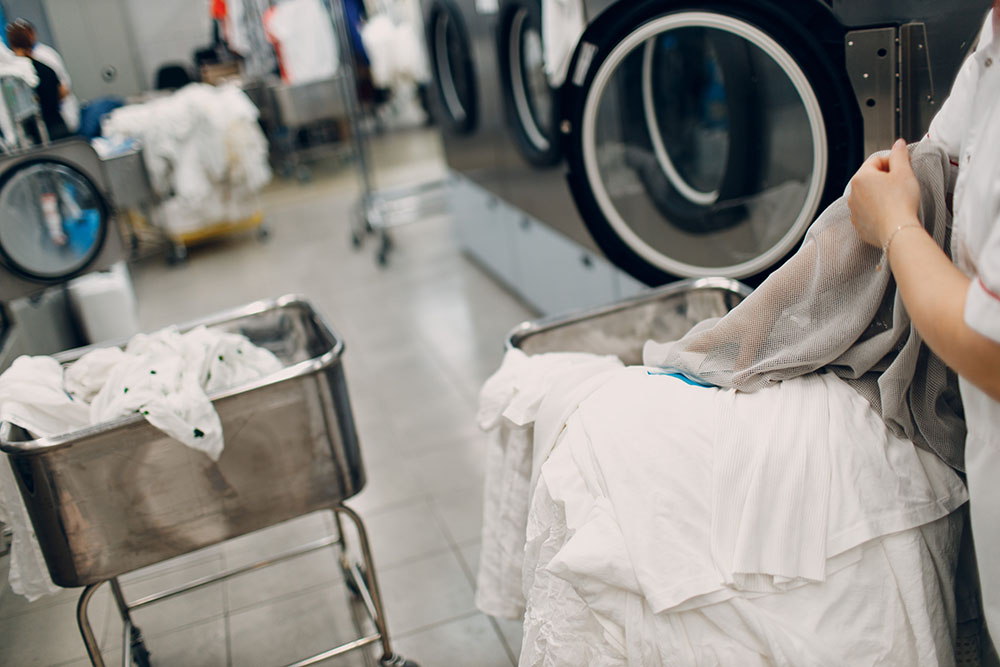Does Dry Cleaning Kill Mould?

CONTENTS
- The science of dry cleaning: understanding the process
- Mould spores and fabric: a complex relationship
- Efficacy of dry cleaning against mould infestation
- Types of mould addressed by dry cleaning
- The role of pre-treatment in mould remediation
- Best practices for preventing mould on textiles post-dry cleaning
- What to do if mould spreads in your home
- Frequently asked questions
- Get in touch
We often associate mould with humid bathrooms and leaking windowsills, but clothing can sometimes become a breeding ground for mould. The spores cling to the fabric and eventually destroy it. However, dry cleaning could be the answer to this solution.
At ICE Cleaning, our mould cleaning services utilise leading technology in the UK, removing mould growths, stains, spores, and odours from your home effectively. We also offer quality post-care services, providing professional guidance to ensure an infestation does not return.
Read on to learn about the science of dry-cleaning and how to keep your clothes mould-free.
The science of dry cleaning: understanding the process
Dry cleaning is a process that cleans clothes without water, using solvents like perchloroethylene. These solvents can dissolve oils and greases that water struggles to, effectively attacking the source of the stain to remove it.
Fabrics pass through a machine where they are gently agitated. The solvent dissolves grime, sparing the fabric from the wear and tear of washing machines.
Once done, they are spun to extract any remaining solvent before being introduced to the air and a vapour recovery filter. They are then pressed, steamed, and ironed for collection.
Whilst dry cleaning works on most fabrics, including delicate ones, it cannot work on fabrics that include sequins, rayon, or plastic. This is due to the solvents that can damage these materials, causing them to dissolve or deteriorate.
Mould spores and fabric: a complex relationship
Mould spores are microscopic spores that latch onto your clothes, easily embedding themselves into the fabric and clinging to the fibres. The spores then feed off our skin cells, moisture from the air, and warmth.
Fabrics like cotton are especially vulnerable to mould as they are delicate and are more vulnerable to spores. Mould digs into those fibres, making removal difficult and sometimes impossible without professional cleaning.
To ensure your clothes are safe from mould, check if their storage spaces are dry and well-ventilated. Purchase moisture absorbers if you are struggling with this, and air out the storage often.
Efficacy of dry cleaning against mould infestation
While studies have shown that solvents used in dry cleaning, like perchloroethylene, are excellent for killing some bacteria, their efficiency against mould is more complex.
Science suggests that while dry cleaning may not remove all types of mould, it can tackle many common varieties found in garments. The effectiveness hinges on factors such as the fabric type and severity of infestation.
If you are dealing with a silk blouse or an expensive suit, seeking professional advice from experienced cleaners could be best for salvaging your wardrobe.
Types of mould addressed by dry cleaning
Dry cleaning can be very effective against certain types of mould due to the use of perchloroethylene, a solvent which is tough on stains and kind to gentle fabrics.
Some moulds are more difficult to remove than others, often due to the fabric and the extent of the infestation. Fabrics like velvet and silk may be hard to clean due to their delicate properties, but if the mould infestation is from a common strain and has not spread, it may be able to be removed.
Chemicals and heat combine during the cleaning process is often enough to kill mould. Depending on the fabric, the dry cleaning process will use heat up to 60-63°C, which is high enough to kill some mould variants.
The role of pre-treatment in mould remediation
A dry cleaning process will include a pre-treatment step where the clothes are inspected for stains and treated. This is usually where the professional cleaners will discern whether or not they can remove the stain and what they can remove it with.
Once the stains are identified, the cleaner will treat the stains with a specific stain remover. This chemical breaks down the proteins in stains, allowing them to dissolve during the proper cleaning process.
If the mould infestation has spread or deeply embedded in the fabric, this solution may help, but it is not guaranteed. As mould is a complex growth, you may not kill it with this process and have to discard the clothing completely.
Best practices for preventing mould on textiles post-dry cleaning
Mould can be a problem for clothing, and it is important to take steps to prevent it from growing. One of the best things you can do is to ensure that the storage space for your clothes is dry and well-ventilated. This means that you should avoid storing clothes in damp or humid areas.
If you are struggling to keep your storage space dry, there are a few things you can do. One option is to purchase moisture absorbers, which can help reduce the humidity in the air. These are typically small packets that you can place in your storage space, and they absorb excess moisture.
Another important step is to air out your storage space regularly. This means opening windows or doors to allow fresh air to circulate. If possible, you should also try to avoid storing clothes in sealed containers or bags, as this can trap moisture and promote mould growth.
If you spot any mould, you must tackle it promptly to prevent it from spreading. By taking steps to prevent mould growth, you can ensure that your clothes stay clean, fresh, and free from damage.
What to do if mould spreads in your home
Dry cleaning might not be sufficient against persistent strains like black mould whose spores penetrate deep into fabric fibres, making them resistant towards conventional treatments. While dry cleaning can reduce mould contamination, it does not necessarily eliminate all spores.
Mould spores can spread from clothes and infiltrate porous materials like wood and plasterboard, leading to rotting structures over time. This destructive process is not always visible on the surface, so early detection is crucial for effective remediation.
Exposure to certain types of moulds, such as Aspergillus and Stachybotrys chartarum (also known as black mould), can lead to respiratory problems like coughing, wheezing or even severe asthma attacks in sensitive individuals.
If you suspect your home is infested with mould, you must contact a mould cleaning company equipped with the tools and knowledge to remove mould safely.
Frequently asked questions
Can dry cleaning get rid of mould?
Dry cleaning can remove mould from fabrics depending on the species and extent of infestation, especially when combined with specific pre-treatments designed for spore eradication.
Does dry cleaning get rid of mould smell?
The solvents in dry cleaning often eliminate the musty odour that mould leaves behind on clothes and textiles.
Can mouldy clothes be saved?
Mouldy clothes can often be salvaged; professional dry cleaners use techniques tailored to tackle stubborn fungal infestations.
Can dry cleaners get mould out of curtains?
Many dry cleaners successfully extract mould from curtains using targeted treatments and processes, but it depends on the fabric and level of infestation.
Get in touch
If you are struggling with mould in your home, you can rely on ICE Cleaning. Our mould remediation services ensure that your home is completely cleared of mould and its spores, cleaning the air to improve your air quality and decontaminating surfaces.
To learn more about our mould removal services, get in touch with our team today at 0208 066 0360 and enquiries@icecleaning.co.uk. We operate nationwide, available to help 24 hours a day, all year round, offering same-day cleaning in emergencies.

Speak with me today,
I’m here to help
By asking you a few questions either via phone or email I can immediately provide a realistic estimation of the cost.
You’re in good company. We’ve cleaned for the following commercial clients… View all

Why choose us?
- Cater to a wide variety of cleaning situations
- Nationwide coverage, available 24/7
- Cater to commercial and domestic clients
- Free survey provided prior to quotation
- Emergency response team
- Offer a bespoke service designed to suit all your needs
- All technicians hold professional health and safety qualifications, including BICSc, IOSH, Dewpoint Professional & Safe Contractor
We’re fully accredited
We place best practise, professional expertise and health and safety at the core of our business. We’re fully compliant with all legal obligations. You can view a list of our accreditations below, or visit our Health & Safety page for more information.











-RGB-small.1707319151.jpg)




















